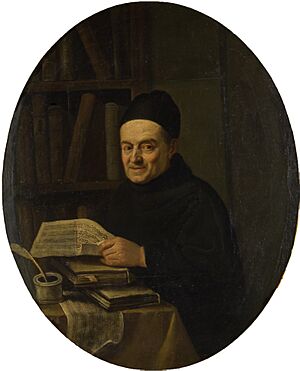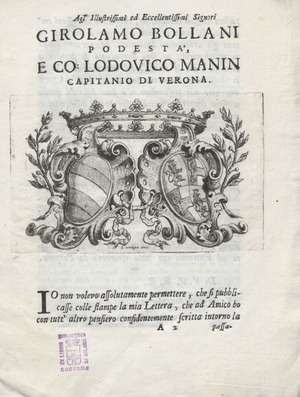Giovanni Battista Martini facts for kids
Giovanni Battista Martini (born April 24, 1706 – died August 3, 1784), often called Padre Martini, was a famous Italian musician, composer, and music historian. He was also a Franciscan friar. Many people considered him a top musician of his time. He even taught and guided young Wolfgang Amadeus Mozart.
Contents
Early Life and Education
Giovanni Battista Martini was born in Bologna, Italy. At that time, Bologna was part of the Papal States. His father, Antonio Maria Martini, was a violinist and taught him the basics of music and how to play the violin. Later, he learned singing and how to play the harpsichord from Padre Pradieri. He also studied counterpoint, which is a way of combining different melodies, with Antonio Riccieri and Giacomo Antonio Perti.
After finishing his general education, he decided to join the Conventual Franciscans. He became a friar on September 11, 1722.
A Talented Musician and Teacher
In 1725, when he was just 19 years old, Padre Martini became the chapel-master at the Basilica of San Francesco in Bologna. His musical pieces quickly became well-known.
He was also a dedicated teacher. Many friends and fellow musicians asked him to start a music school. He did, and many famous musicians learned from him. As a teacher, he preferred the older style of music from the Roman school of composition.
Padre Martini loved collecting musical books and scores. He had a huge music library! Some people estimated he had about 17,000 books. After he passed away, some of his collection went to the Imperial Library in Vienna. The rest stayed in Bologna and is now at the Museo Internazionale della Musica.
Mentoring Young Mozart
Most musicians of his time admired Padre Martini. Leopold Mozart, the father of Wolfgang Amadeus Mozart, even asked him for advice about his son's musical talents. Young Wolfgang Amadeus Mozart himself visited Padre Martini in Bologna and wrote him very kind letters afterward.
In 1758, Padre Martini was invited to teach at the Accademia Filarmonica di Bologna. He continued to teach and compose until his death in Bologna.
Famous Students
Padre Martini taught many talented students who became famous musicians. Some of them include:
- André Ernest Modeste Grétry from Belgium
- Josef Mysliveček from Bohemia
- Maksym Berezovsky from Ukraine
- Stanislao Mattei, who was also a Franciscan friar and took over Padre Martini's role
- The young Wolfgang Amadeus Mozart
- Johann Christian Bach
- The famous Italian cellist Giovanni Battista Cirri
Musical Works and Writings
Most of Padre Martini's musical pieces were sacred, meaning they were written for church. Many of these works were never printed. The Liceo of Bologna has the handwritten copies of two of his oratorios (large musical works for voices and orchestra). They also have three intermezzos, which are short musical plays, including L'impresario delle Isole Canarie. A requiem (a mass for the dead) and other church music pieces are now in Vienna.
Some of his published works include:
- Litaniae atque antiphonae finales B. V. Mariae (1734)
- Twelve Sonate d'intavolatura (1734)
- Six Sonate per l'organo ed il cembalo (1747)
- Duetti da camera (1763)
Padre Martini's most important writings are his Storia della musica (History of Music) and his Esemplare di contrappunto (Examples of Counterpoint).
- The Storia della musica (1757–1781) has three volumes. It covers only ancient music and shows how much he read and researched.
- The Esemplare di contrappunto (1774–1775) is a valuable book. It contains many examples from the best old Italian and Spanish composers. It also has helpful notes explaining how to combine melodies.
Padre Martini also wrote a Dictionary of Ancient Musical Terms. He even published a book about The Theory of Numbers as Applied to Music. His famous canons, which are musical pieces where a melody is repeated by different voices, show that he had a great sense of musical humor.
See also
 In Spanish: Giovanni Battista Martini para niños
In Spanish: Giovanni Battista Martini para niños
 | Isaac Myers |
 | D. Hamilton Jackson |
 | A. Philip Randolph |



